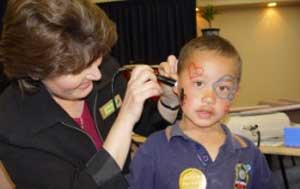Clinical Psychologist
Tasks & duties

Clinical psychologists may do some or all of the following:
-
assess the emotional and lifestyle problems of clients
-
study clients' medical, social and family histories
-
study how the feelings, actions, beliefs, experiences and culture of people interact to shape their experiences
-
interview and observe clients
-
apply therapy to a broad range of issues and clients, including children, adults, couples, families and communities
-
give psychometric and neuropsychological tests to identify problems, and measure clients' skills and abilities
-
discuss the treatment of problems with clients
-
develop individual treatment plans to address psychological difficulties and issues, and/or treatment of mental illness
-
evaluate the effects of this treatment
-
write reports on clients
-
keep up to date with research
-
assist in group therapy with social skills, anger-management or assertiveness training
-
take leadership or management roles in multi-disciplinary teams
Specialisations
Experienced clinical psychologists may specialise in certain areas such as community mental health services, forensic services, psychogeriatric services, Māori mental health and maternal mental health.
Skills & knowledge

Clinical psychologists need to have:
-
knowledge of human behaviour and thought
-
specialist skills in assessing behaviour such as neuropsychological, personality and child-assessment skills
-
skill in providing the appropriate treatment or therapy for clients
-
up to date knowledge of theories on aetiology (causes) and clinical psychology research
-
up to date knowledge of statistics and research methods
-
listening and interviewing skills, including skill using different interviewing methods
-
good people and communication skills
-
understanding and awareness of other cultures
-
research skills
-
report writing skills
-
effective time management skills
Clinical psychologists who are self-employed also need to have business skills. For those who specialise in working with Māori communities, knowledge of Māori language and culture is essential.
Entry requirements
To become a clinical psychologist you need to complete a Masters degree in psychology and a postgraduate diploma in clinical psychology, or a Doctorate degree in clinical psychology.
To enter the diploma course a minimum of six years study is required, which involves clinical and research qualifications.
Secondary education
A tertiary entrance qualification is required to enter further training. Useful subjects include English and maths.
Training on the job
Businesses, government departments and hospitals often run their own in-house training courses. Workshops and ongoing training programmes are also available through professional societies such as the New Zealand Psychological Society.
It is expected that clinical psychologists will undertake ongoing training as part of their registration in the future.
Registration
Clinical psychologists must be registered with the New Zealand Psychologists Board.
Useful experience
Useful experience for clinical psychologists includes:
-
work experience with community groups
-
voluntary work
-
work with telephone support agencies such as Youthline
-
work with mental health clients through supported accommodation agencies
These experiences will give an indication of whether someone who is interested in becoming a psychologist is able to work well with people who have mental health problems.
Related courses
Counselling
Psychology
Youth Work
For more information, please refer to Career Services.
Document Actions
